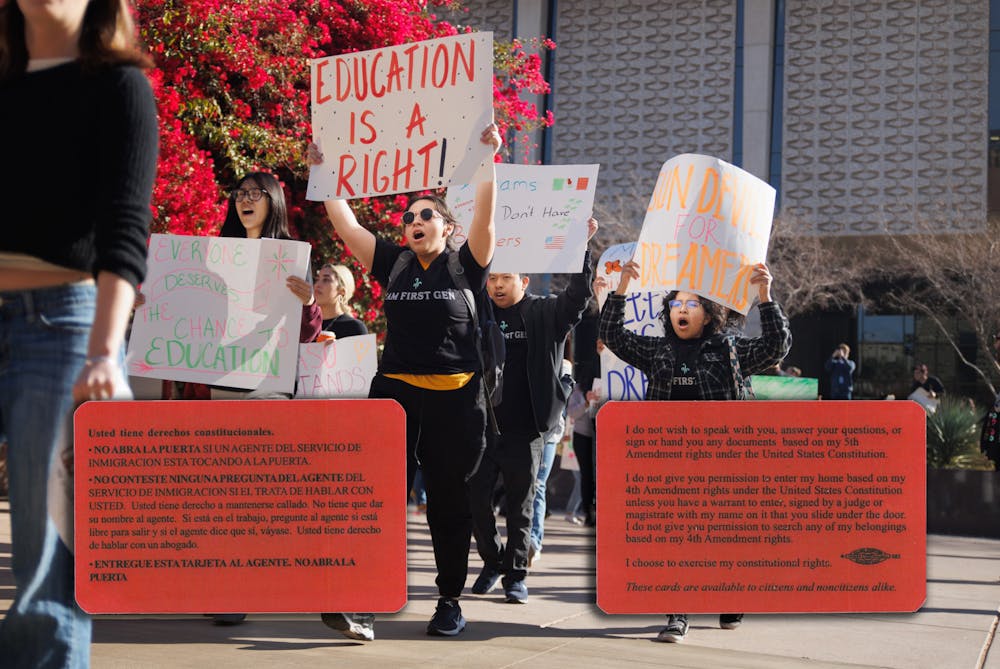Amid a tense political climate, the University and organizations around the Phoenix area have made it a priority to focus on education about immigrant rights.
During a press conference held at the White House, Press Secretary Karoline Leavitt stated the Trump administration considers all immigrants lacking permanent legal status as criminals.
"I know the last administration didn't see it that way, so it's a big culture shift in our nation to view someone who breaks our immigration laws as a criminal," Leavitt said. "But that's exactly what they are."
Ivette Sosa Barraza, an ASU alum and family and community liaison at Aliento Arizona, said accusatory rhetoric and the political climate have caused fear in the immigrant and mixed-status families in Arizona.
Sosa Barraza said there has been misinformation spread on social media, prompting Aliento AZ to hold various workshops dedicated to legal rights education.
"Aliento has been focusing on providing the resources and the knowledge that our community needs in order to stay safe and prepare for what is to come or for what has been communicated from the current administration," Sosa Barraza said.
Sosa Barraza said one of Aliento's goals is to persuade students to keep studying regardless of fears they may have.
“Knowledge is power," Sosa Barraza said. "Your education is power. That's something that can't be taken away from you."
Aliento at ASU, with the help of Aliento Arizona, held a "Know Your Rights" workshop on Feb. 5 on the University's Tempe campus.
Sosa Barraza led the meeting, hosting a presentation on immigration-related rights to over 40 attendees.
"I do want to reiterate that anyone in the U.S., regardless of immigration status, has rights, and that's why we are all here today — to learn about what that looks like," Sosa Barraza said.
In her presentation, Sosa Barraza focused on the importance of understanding the difference between an Immigration and Customs Enforcement warrant and a judicial warrant.
She said an ICE warrant, issued by the U.S. Department of Homeland Security and signed by an agent, does not grant officers the right to enter a home. In contrast, a judicial warrant, issued by a district court and signed by a judge, must include the name of the specific person listed and does grant access.
Sosa Barraza also said it's important to have a plan in place to protect one's family.
"It's important to make sure that you have a power of attorney card ready, making sure someone else can have custody of a child if something were to happen to you," Sosa Barraza said.
Barraza recommended for people to have a plan and to make it "now rather than later."
University clubs have taken similar initiatives.
Last month, Young Democrats at ASU hosted a "Know Your Rights" event, where attendees cut and laminated red cards to distribute to educators across schools in Tempe and Phoenix.
The red cards are double-sided. Generally, one side is in Spanish and informs the cardholder they have the right to deny people access to their home and the right to not speak with anyone who knocks on their door. The other side, in English, says the card holder does not wish to speak with the person at their door and does not give them permission to enter their home — aiming to act as a translation between Spanish-speaking individuals and English-speaking ICE officers.
However, red cards can come in many variations of languages to inform individuals of their rights.
Deetrel Ellis, the growth and diversity chair for Young Democrats at ASU and a junior studying political science, believes the red card initiative is crucial, considering the country's current political climate.
"I hope that everyone else can look at those red cards and actually read the lines and understand what it does say, because those red cards are actually life saving to undocumented immigrants," Ellis said.
READ MORE: College Republicans United asks students to report fellow classmates to ICE this Friday
The Chicano/Latino Law Students Association at ASU also hosted a forum discussion on Feb. 6 to encourage community members to come together and discuss how they can participate in advocacy and support.
"People are looking to community leaders and community organizations to take the lead on how to take action," said Emma Galligan, a third-year law student and president of CLLSA at ASU.
Galligan stressed understanding rights specific to Arizona, noting that national organizations often provide blanket statements that do not take state-specific statutes into account.
Galligan said she bears the responsibility of informing her community on how to keep themselves safe as a law student in the University.
"For a lot of our members, we're the first lawyers in our families," Galligan said. "With that comes the sort of responsibility, and you get put on a pedestal, and people go to you to find information."
Katrina Michalak contributed to this reporting.
Edited by George Headley, Sophia Braccio, Tiya Talwar, Alexis Heichman and Natalia Jarrett.
Reach the reporter at vcruzbut@asu.edu and follow @valeriacbutron X.
Like The State Press on Facebook and follow @statepress on X.




